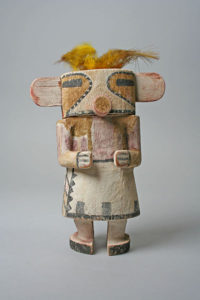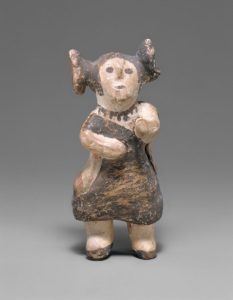A third version of the Safeguard Tribal Objects of Patrimony (STOP) Act, (H.R. 3846 in the House) was introduced on July 18, 2019. Sponsor Senator Martin Heinrich, who introduced a parallel Senate bill (S.2165), says the STOP Act will “prohibit the exporting of sacred Native American items and increase penalties for stealing and illegally trafficking tribal cultural patrimony.”

National Museum of the American Indian, New York, An exterior photograph of the front of the George Gustav Heye Center in New York City, Author Samir Bitar, 2008, Wikimedia Commons.
Others vehemently disagree. ATADA, an art dealer, collector and museum organization, has advocated strongly for protecting sacred items and established a grass-roots, community-based program to return sacred objects to tribes. ATADA says that the bill will be disastrous for all businesses selling Native art across the country, for tourism in the Southwest, and for Native American artisans.
“We all want to halt illegal trafficking and bring sacred items back to tribes. Building ethical relationships with the tribes is an important part of ATADA’s job. It’s the foundation of our Bylaws and our community-based Voluntary Returns Program. We’ve brought close to 200 important sacred items back to tribes in just a few years,” says ATADA’s President, Kim Martindale. “These items were lawfully owned by private collectors, but they needed to go back to support the tribes’ goals.”
But, according to Martindale, “This 2019 STOP Act is seriously flawed. It doesn’t just restrict export of sacred items. It requires a permit for items as low as $1 in value and keeps secret what can and can’t be exported. The way this bill is written, it can require every person carrying or shipping an Indian item out of the U.S., including small items purchased by tourists, to submit a photograph and a form through a federal system that will have to be created from scratch. To get an export permit, each item will be subject to tribal review covering the 568 federally registered tribes, plus Hawaiian organizations and Alaskan villages. The review system will operate in secret, and without any time limit.”
Because the bill doesn’t specifically identify what it covers and can include commercial items, it will force people to guess whether they need to apply for a permit. Martindale explained, “There is not even a way to find out the reason for a seizure through a Freedom of Information Act request.” Under the bill, the item does not have to be illegally owned or stolen to be seized. “If they guess wrongly,” he said, “not only is the item seized, there is little they can do to appeal.”

Katsina (Tcosbuci), 20th century , Hopi, 20th century, Gift of Lillian Dunn Miller, 1986, Accession # 1986.35.6. Metropolitan Museum of Art, NY.
ATADA’s analysis notes that there are even more serious flaws in the STOP Act that should give legislators pause.
ATADA says the immediate effect will be to discourage tourism, paralyze small businesses, and harm Native artisans. “Can you imagine,” say Martindale, “what the effect will be the first time a tourist has an item seized, not because there is anything wrong with it, but only because it has not been subjected to this tribal review?” He grimaced. “Once the word gets around at home, that’ll be the last Italian or German tourist that will come to Santa Fe, and that will really hurt the tribal artisans that rely on the tourist market for most of their annual income.”
Martindale says that his organization wants to work with all parties to fix the bill.
“In 2018, ATADA worked together with tribes and legislators to craft a bill that would protect sacred items. H.R. 7075, the Native American and Native Hawaiian Cultural Heritage Protection Act of 2018, was designed to enhance protections for Native American cultural heritage. It established a practical system for export based around a U.S. Customs system already in place, enabled tribal review, punished violators, and at the same time, allowed businesses to self-certify low value items so the trade in all Indian arts and crafts would not come to a halt.”
Unfortunately, he says, the 2019 STOP Act completely ignores the solutions agreed to and the congressional session ended while the 2018 bill was still in committee. “We can do better than this, working together.”

A drawing of a Mississippian culture Nashville I style shell gorget with a triskele design found by William Myer at the Castalian Springs Mound Site in Sumner County, Tennessee and now part of the collection of the National Museum of the American Indian. Gates P. Thruston (1897) The Antiquities of Tennessee (2nd ed.), Cincinnati: The Robert Clarke Company. Wikimedia Commons.
Practical Issues with 2019 STOP Act:
-
- No dollar threshold.
- No coordination with U.S. Customs export systems.
- No self-certification as agreed to in negotiations with the Acoma tribe in 2018.
- No limit on the types of material that can be restricted.
- Includes commercially made items and recently-made art among items requiring tribal review.
- 2019 STOP Act language is ambiguous and is not clearly defined.
Public Policy Issues with 2019 STOP Act:
-
- The unlimited time frame for processing will make it impossible for American businesses to participate in the international art market.
- The documentation requirements for low value items will push small businesses out of the tourist market.
- Much of the 2019 STOP Act is redundant to existing U.S. law.
- There is no evidence showing that STOP is needed. The GAO reports for previous versions of STOP counted the overseas sales (and counted the same objects multiple times) without identifying any items as actually sold in violation of ARPA, NAGPRA or other US law.
Museum Issues with 2019 STOP Act:
- STOP 2019 treats NAGPRA’s definition of “cultural items” as one category when NAGPRA has five separate categories of cultural items with separate statutory definitions.
- NAGPRA claims are dealt with in a case-by-case process with museums; the tribes must demonstrate proof of a claim. Under STOP, tribes have no need to show affinity or substantiate that an object may be claimed. “Cultural items” under NAGPRA often refer to objects known only to specific tribes among the 568 currently federally recognized tribes.
- The 2019 STOP Act makes it illegal to export “cultural items” – a term that includes items that are not subject to NAGPRA repatriation, and might only be known to certain people in certain tribes. Export by museums of some of these items, which could well have been legally-acquired decades ago, could put museums in violation of the STOP Act.

Figurine, ca. 1879, Hopi, ca. 1879, ceramic, Ralph T. Coe Collection, Gift of Ralph T. Coe Foundation for the Arts, 2011, Accession Number: 2011.154.168, Metropolitan Museum of Art.
- While museums generally do not export objects for commercial purposes, they might make loans to foreign museums, which would be prohibited under the 2019 STOP Act, should one of the exported objects be claimed by a tribe.
Constitutional Issues with 2019 STOP Act:
- Criteria for Export Certification is based on a secret decision by reviewing tribes.
- Items can be prohibited export even if they are legally owned.
- Criminal penalties of up to ten years incarceration for exporting lawfully owned items without a permit.
- Law does not require “knowing” wrongdoing for there to be a crime.
- Does not require proof of violation of U.S. law.
- Terms are so vague seizure of objects exported in good faith will result.
- No constitutionally mandated due process. No list of forbidden items exists.
- Evidence from tribes is withheld from exporters.
- Reverses the American concept of innocent until proven guilty. It places the entire burden of proof for enabling export on an exporter, even a tourist.
- Eliminates Freedom of Information Act access to information.
 Side of the National Museum of American Indian in Washington, D.C., Author Aguebor, 10 September 2017. Wikimedia Commons.
Side of the National Museum of American Indian in Washington, D.C., Author Aguebor, 10 September 2017. Wikimedia Commons. 

